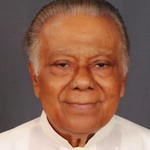The Case For A Sangha Rebellion: Revolution Or Reform? Who Will Bell The Cat?
 My colleague in the CCS, C. R. De Silva has asked me for my comments on the article,”Buddhism & Good Governance: The Case for a Sangha Rebellion” published recently in the Colombo telegraph in two instalments, for his information. CR was keen to have my comments as he had recently published ideas on the same line. Though I do not have the background to comment on the ideas of an international anthropologist and sociologist like Prof. H. L. Seneviratne, I decided to share my views with the reading public in general. I am only a lay Buddhist who identifies himself with the being at the edge of the universe. These comments are made from that point of view.
My colleague in the CCS, C. R. De Silva has asked me for my comments on the article,”Buddhism & Good Governance: The Case for a Sangha Rebellion” published recently in the Colombo telegraph in two instalments, for his information. CR was keen to have my comments as he had recently published ideas on the same line. Though I do not have the background to comment on the ideas of an international anthropologist and sociologist like Prof. H. L. Seneviratne, I decided to share my views with the reading public in general. I am only a lay Buddhist who identifies himself with the being at the edge of the universe. These comments are made from that point of view.
In his article, the Professor has made a distinction between the worldview of ‘Sinhala Cultural Buddhism’ and that of ‘Philosophical Buddhism’. His challenge is to try and imbue the society with the universalist ethicality of Philosophical Buddhism, and its ethos of urbanity, civility and modernity’ He is calling upon the more educated and dynamic sections of the saṅgha to accept that challenge, and give leadership to a social movement for meeting it. The Professor has logically analysed the path of deterioration of Philosophical Buddhism to Political Buddhism.
He traces the development from the time of the Buddha, when an attempt was made to harmlessly purge the island of non –Buddhist elements or to convert them. According to the worldview, classically expressed in the national chronicle Mahāvaṃsa, Sri Lanka belongs to its ethnic and religious majority, the Sinhala Buddhists. It has been foreseen by the Buddha that it is in Sri Lanka that his dharma would shine, making it the Dhammadipa, “the island of righteousness”. The Sinhala Buddhist worldview did not wither away, but within the reality of day-to-day social relations it had no relevance, and people of different ethnicities and religions interacted with each other freely, pragmatically and profitably.
The conquest of Sri Lanka by the British resulted in a framework of modern democratic governance but did not change the traditional world view of governance. A revolutionary change took place with the fall of the conservative government in 1956 and until now (2017) it is a story of compromising that view in turn by both major political parties. It was a shift in the value system that underlay political action. In contrast to the government just voted out of office, the newly elected coalition championed ethnicity, language, religion and “culture”, i.e., the ingredients of the Sinhala Buddhist worldview. For this purpose they designed a platform whose main ingredients were the replacement of English with the majority language Sinhala as the official language, and giving recognition and material support for religion and “culture”. The electoral appeal of this platform was so powerful that the relatively secular and cosmopolitan UNP gradually accepted it, making it virtually the non-negotiable clause in the platforms of both major national parties.
It was a shift in the value system that underlay political action. In contrast to the government just voted out of office in1956, the newly elected coalition championed ethnicity, language, religion and “culture”, i.e., the ingredients of the Sinhala Buddhist worldview. The reforms of 1992 and 1998 lead to the increasing spread of bribery, corruption, and nepotism; the politicization of all institutions; fraud, inefficiency and unaccountability in everything; breakdown of the judiciary, the police and the administrative service; indiscipline at work, leisure, and on the roads; and more.
Although I agreed with the Professor’s learned analysis of the origins and the development of cultural development of Buddhism to the detriment of good governance, I was left with some doubts. Having named certain monks who took a positive interest in advancing the pragmatic world view of Buddhism, he expected the Sangha to initiate a revolution that would usher in that view. The movement led by the Vidyōdaya monks in the 1930 and 1940s that they termed “rural development” (grāma saṅvardhana) that combined the religious and the economic, the moral and the material came closest to such a revolution but it fizzled out without making a lasting impact on Buddhist society. For myself, I doubted the emergence of a lasting revolution headed by the sangha.
These doubts have been eloquently expressed in the CT by Dr. Siri Gamage, the Professor’s former pupil in Sociology and anthropology at the Peradeniya University, with the following questions on his former teacher’s recommendations with which I identify myself.
1. How far a rebellion of the educated and cosmopolitan Sangha aimed at reviving the society’s value system based on philosophical Buddhism and ethics can be a solution to what is essentially a political and to some extent an economic problem?

